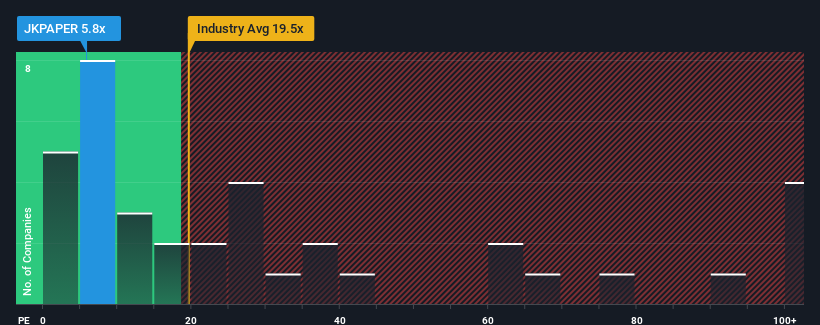- India
- /
- Paper and Forestry Products
- /
- NSEI:JKPAPER
JK Paper Limited's (NSE:JKPAPER) Price Is Right But Growth Is Lacking
JK Paper Limited's (NSE:JKPAPER) price-to-earnings (or "P/E") ratio of 5.8x might make it look like a strong buy right now compared to the market in India, where around half of the companies have P/E ratios above 32x and even P/E's above 60x are quite common. However, the P/E might be quite low for a reason and it requires further investigation to determine if it's justified.
With earnings growth that's inferior to most other companies of late, JK Paper has been relatively sluggish. The P/E is probably low because investors think this lacklustre earnings performance isn't going to get any better. If this is the case, then existing shareholders will probably struggle to get excited about the future direction of the share price.
View our latest analysis for JK Paper

What Are Growth Metrics Telling Us About The Low P/E?
There's an inherent assumption that a company should far underperform the market for P/E ratios like JK Paper's to be considered reasonable.
Retrospectively, the last year delivered a decent 3.8% gain to the company's bottom line. Pleasingly, EPS has also lifted 497% in aggregate from three years ago, partly thanks to the last 12 months of growth. Accordingly, shareholders would have probably welcomed those medium-term rates of earnings growth.
Turning to the outlook, the next year should bring diminished returns, with earnings decreasing 0.2% as estimated by the two analysts watching the company. That's not great when the rest of the market is expected to grow by 24%.
With this information, we are not surprised that JK Paper is trading at a P/E lower than the market. However, shrinking earnings are unlikely to lead to a stable P/E over the longer term. There's potential for the P/E to fall to even lower levels if the company doesn't improve its profitability.
The Key Takeaway
While the price-to-earnings ratio shouldn't be the defining factor in whether you buy a stock or not, it's quite a capable barometer of earnings expectations.
As we suspected, our examination of JK Paper's analyst forecasts revealed that its outlook for shrinking earnings is contributing to its low P/E. Right now shareholders are accepting the low P/E as they concede future earnings probably won't provide any pleasant surprises. It's hard to see the share price rising strongly in the near future under these circumstances.
Don't forget that there may be other risks. For instance, we've identified 1 warning sign for JK Paper that you should be aware of.
You might be able to find a better investment than JK Paper. If you want a selection of possible candidates, check out this free list of interesting companies that trade on a low P/E (but have proven they can grow earnings).
New: Manage All Your Stock Portfolios in One Place
We've created the ultimate portfolio companion for stock investors, and it's free.
• Connect an unlimited number of Portfolios and see your total in one currency
• Be alerted to new Warning Signs or Risks via email or mobile
• Track the Fair Value of your stocks
Have feedback on this article? Concerned about the content? Get in touch with us directly. Alternatively, email editorial-team (at) simplywallst.com.
This article by Simply Wall St is general in nature. We provide commentary based on historical data and analyst forecasts only using an unbiased methodology and our articles are not intended to be financial advice. It does not constitute a recommendation to buy or sell any stock, and does not take account of your objectives, or your financial situation. We aim to bring you long-term focused analysis driven by fundamental data. Note that our analysis may not factor in the latest price-sensitive company announcements or qualitative material. Simply Wall St has no position in any stocks mentioned.
About NSEI:JKPAPER
Flawless balance sheet and undervalued.
Market Insights
Community Narratives




